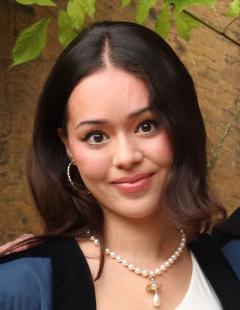Maya Beney
Tell us about your background
I'm from South London, and read for an undergraduate degree in History at the University of Cambridge between 2019 and 2022. I wrote my undergraduate thesis on the community location, cohesion, and betrayal among hidden Christians in 17th century Japan, and a long essay on the semiotics of memory and the senses in the Reformation. I also dabbled in migration history, which brings together the two scholarly silos of migration studies and history.
In the summer after I graduated, I volunteered in Zahlé, Lebanon, for a month with the grassroots NGO TheHealthImpact. I worked with Syrian refugee women, children, and co-ordinated with local healthcare and sexual and gender-based violence (SGBV) actors.

“There’s the space to engage with scholarship across law, politics, anthropology, philosophy, and more, while still being able to carve out your own scholarly niche through the thesis.”
“There’s the space to engage with scholarship across law, politics, anthropology, philosophy, and more, while still being able to carve out your own scholarly niche through the thesis.”
What made you choose to study at ODID?
At Cambridge I had benefitted immensely from the close supervision system (called tutorials in Oxford!) where teaching is primarily one-on-one. I knew I wanted to keep studying under this system, and it also helped that ODID has been a pioneer in Refugee Studies since the 1980s. Most of the research that I had read had come from the Refugee Studies Centre so I was excited to meet and be taught by the academics here.
What do you particularly like about ODID?
So many things! I'll start with the people. My coursemates on the programme have been the kindest, most empathetic group of students that I've encountered. I was a bit apprehensive at first because this is a competitive master's during the application process, but I didn't feel in competition with the rest of my peers. My supervisor, Professor Tom Scott-Smith, has also been very supportive this year. I'm grateful to everyone in the Refugee Studies Centre.
More broadly, I admire ODID's cosmopolitanism, and its willingness to grapple with the epistemic legacies of an academic field that was rooted in colonial expansion. This self-reflective, self-critical nature is important to me, alongside their support of refugee-led research.
What do you particularly like about your course of study?
I came into the master's programme as a staunch historian, but I've completed the degree calling myself a philosophical anthropologist. Prior to coming here I would not have called myself either. I think this is the intellectual beauty of doing such an interdisciplinary degree. There's the space to engage with scholarship across law, politics, anthropology, philosophy, and more, while still being able to carve out your own scholarly niche through the thesis.
What did you research for your dissertation?
My research examines humanitarians, perceptions of time, and how this shapes “durable solutions” for forcibly displaced Syrians. Temporality is an under-discussed element of development and humanitarian governance. While research has been conducted on refugees' and displaced persons' perceptions of time, humanitarians need to be understood as the connective link between headquarters' decision-making, and beneficiaries' lived experiences. I examined this using documents and material objects, drawing upon Tom Scott-Smith's work, and framing my argument through Proust's concept of the dreamtime. My research is generously supported by the Economic and Social Research Council, and Lincoln College's Kingsgate Master's Award.
What other activities have you been involved with at Oxford?
As Co-President of the Oxford Migration Studies Society I worked with students from the MSc in Migration Studies programme to create an academic conference in May, wherein I chaired a panel discussion.
Is life at Oxford different from how you expected it?
I think the biggest difference for me was the undergraduate versus postgraduate communities. I liked the latter but did find it occasionally difficult to navigate as I was younger than most postgraduate students. That being said, it was great to meet so many people with interesting life experiences and wisdom to impart. Oxford does come with a set of attached misconceptions, which are similar to the myths about Cambridge that I tried to dispel during outreach work. Preconceptions such as the rituals and tradition do hold true, if you want them to, but life at Oxford is ultimately what you shape it to be.
What advice would you give to someone thinking of applying?
Look carefully into the different funding options for the programme. Think about the research that you want to do, and your own personal motivations for wanting to study a course that is intense – academically, and emotionally. The first step to studying here is applying, so do! I wasn't expecting to receive an offer at all: it was a lucky surprise. Ultimately, while it is a competitive master's degree, remember that others are also applying with good motivations. A master's degree is an individual achievement, but with this course we study for the collective goal of improved conditions for millions of displaced persons.
